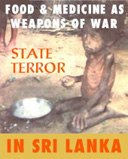"To us all towns are one, all men our kin. |
"To us all towns are one, all men our kin. |
| Home | Trans State Nation | Tamil Eelam | Beyond Tamil Nation | Comments |
Sri Lanka's Genocidal War - '95 to '01

Government officers and teachers have been ordered to obtain permission from the military before entering these areas. Officers and teachers, who are expected to visit the areas daily, say this is impractical and will adversely affect their work. A team of Education Department officers who went for inspection of schools on 15 March were turned back at the Karuthapalam bridge in Chenkalady. Ninety of the 320 schools in the district are in LTTE areas. A hundred youths who had been selected for leadership training by the National Youth Services Council were also turned back on 20 March at Valayiravu bridge further south and Karuthapalam. Press reports say the ICRC which escorts food lorries and runs mobile clinics in Tiger areas was also denied permission on 20 March.
Restrictions on food, fuel, medicines, fertiliser and other essential needs, already in force, have affected the daily life of the people, small industries and agriculture. Medical facilities are minimal and reports say that in the last two months, ten people died of rabies in northern Batticaloa..." British Refugee Council, Sri Lanka Monitor March 2001
"..In an article in the Sunday Times (London) on 15 April, journalist Marie Colvin says that the economic embargo by Colombo has created a huge but unreported humanitarian disaster for the 500,000 civilians, more than half of them internal refugees. She points out that Colombo prohibits international aid agencies distributing food in the region. Aid agencies estimate that 40% of the children in the Vanni are undernourished or malnourished.Government ministers deny that there is an economic embargo on the Vanni, while checkpoints enforce a ban on items ranging from fuel, cement, and plastic sheeting to instant noodles and vegetable oil. Even sanitary towels are not allowed; they can presumably be used to dress wounds. The Vanni region, which covers 2,000 square miles, has no mains electricity or telephone service; its roads have deteriorated to dirt tracks. Most people travel by bicycle because of the fuel shortage. The day following the report, Marie Colvin was shot and injured in the Vanni.
After visiting the Vanni in late April, a delegation of southern Catholic Bishops also expressed concern over the plight of children. In early April, two children died in Mallavi hospital. A total of eight people died in the hospital in the previous month, where 12,192 people were treated, 1,108 for malaria. Reports say that 151 children died between 1997 and 2000 in Kilinochchi hospital..."British Refugee Council, Sri Lanka Monitor April 2001
"In the Vanni, the government economic blockade continues to cause problems. Mullaitivu District has not received malathion insecticide needed for malarial prevention. District Medical Officer Dr Jayakularajah says that malaria is on the increase as a result. Rabies injections are not available in hospitals in the district and reports say patients are expected to travel to Vavuniya for treatment..." British Refugee Council, Sri Lanka Monitor May 2001
continued